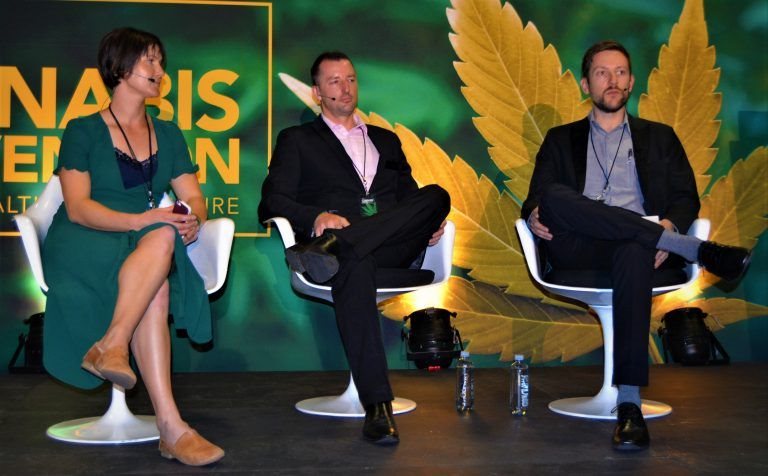The Cannabis Convention was recently held at the Sandton Convention Centre in Johannesburg. The event hosted myriad exhibitors, speakers and industry leaders all exploring a wide range of industry-related topics including cannabis regulation, legislation, intellectual property rights of farmers, and plant and soil health.

Image via
AgriOrbit -
From left to right: Hanna Shanes, Chief Compliance Officer at 365 Vertical, Nick Verster of NVJ Quality Products and Paul-Michael Keichel, a partner at Schindlers Attorneys. (©Ursula Human)
According to the African Cannabis Report, Nigeria and South Africa stand to become the continent’s highest value markets by 2023 if cannabis usage is permitted for medicinal and recreational use. South Africa’s cannabis industry alone could be worth more than R107 billion once it becomes fully legalised.
Learning from Lesotho’s legalisation process
The decriminalisation of cannabis took place in Lesotho in 2017. Commercial farmers who can afford the initial (R500 000) and yearly (R130 000) licencing fees required to legally produce cannabis have utilised this opportunity to expand their farming enterprises. However, many smallholder farmers have not been able to benefit from the legalisation of dagga solely because of the expensive licensing fees. Instead, they illegally capitalise on South Africa’s high demand for cannabis.
South Africa’s market for cannabis or related products has an estimated value of $1,2 billion. The climate in KwaZulu-Natal and the Eastern Cape is also especially suited to cannabis cultivation, which means that the country’s economy stands to benefit immensely from the decriminalisation and legal farming of cannabis.
Regulation and licensing
However, establishing and enforcing regulations to help this booming industry to thrive is still an ongoing process in South Africa. Although the Constitutional Court legalised the cultivation of dagga for adults for private use in a private setting in September 2018, cultivating cannabis cultivars commercially for recreational use is still illegal.
Licensing for the cultivation and processing of cannabis as a herbal raw material for the production of registered medicines can be applied for at the South African Health Products Regulatory Authority (SAPRAH). Each medicinal licence is valid for five years and the production or processing of cannabis for medicinal use must comply with strict conditions during this time.
In May 2019, the minister of Health removed cannabidiol (CBD) from the list of schedule 7 drugs, thus classifying all CBD-containing products as schedule 4 substances. However, certain CBD products can be sold over the counter without a prescription from a medical practitioner if the product contains a maximum daily dose of 20mg CBD and a tetrahydrocannabinol percentage of less than 0,001%.
Back in 2018, the Constitutional Court gave the South African government 24 months to establish laws that are in line with the Constitution in terms of cannabis use.
Benefiting commercial and smallholder farmers
Seeing as a commercial cannabis production facility could cost up to R5 million and irrigation costs could total another R2 million, many industry leaders are looking to ensure regulations that will benefit smallholder farmers as well.
In order to empower every farmer interested in cultivating cannabis while still upholding safety and legal standards, both industry and regulatory bodies will need to work together to create sustainable and enforceable legal frameworks that will truly drive economic growth. Schindlers Attorneys, South Africa’s first and only law firm to have a department dedicated to medicinal and recreational cannabis law also weighed in on the matter. "Prior to approaching the government, every stakeholder in the cannabis industry needs to reach an agreement and represent a united front in order to lobby for legislation that benefits both the big enterprises and the little guy,” says Paul-Michael Keichel, a partner at Schindlers Attorneys.
"Another pressing problem currently is that cannabis and hemp, although they are the same species, are very different beasts when it comes to their application. Presently, the law makes no distinction between cannabis and hemp, which is defined as non-psychoactive cannabis. It only differentiates between processed hemp, which means you can’t grow a field of hemp and industrialise it, you have to import processed hemp or hemp seed oil, which is a huge wasted opportunity. The current over-regulation and the old way of doing things are getting in the way of economic opportunities."
Andrew Lawrie of Schindlers Attorneys also provided a comprehensive overview of South Africa’s current cannabis legislation and its resulting impact on the agricultural industry.
"We should help regulators by having open conversations about these hurdles and showing an intent to comply," concluded Nick Verster of NVJ Quality Products.

















































